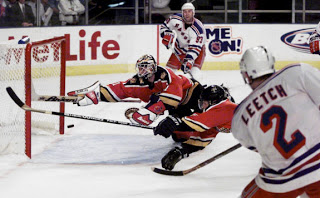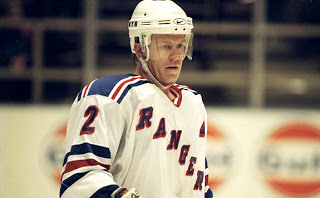
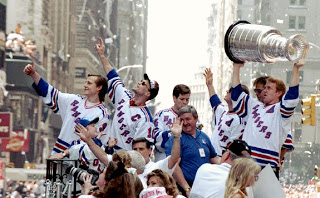
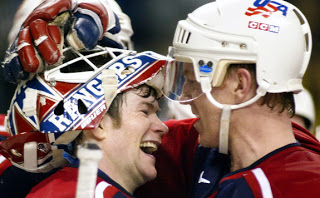
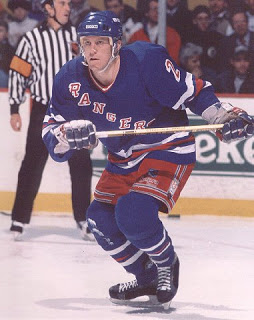
I have had the honor to represent Brian since that time, now more than 20 + years ago, and it is awesome to join in the celebrations and honors that Brian is receiving. What is even more special is that Brian continues to be honored as much for who he is off the ice as for his hockey accomplishments.
My first vivid memories of Brian’s career, after an outstanding freshman Hockey East MVP season at Boston College, are of his time with the 1988 U.S. Olympic Team. This was a close knit group at a time when college players barnstormed across the country and internationally prior to the Olympic Games held that year in Calgary. This was the post wave group of kids playing their pee-wee hockey in the shadows of the Miracle on Ice and featured Mike Richter, Kevin Stevens, Tony Granato, and Scott Young. The team trained extensively on the Olympic ice surface in Lake Placid (now Herb Brooks arena). Though one of the youngest on the team, Brian was named captain of this team and despite high expectations other nations were still fielding semi-professionals (not amateurs) and the US placed seventh.
I was with Brian as he immediately flew from Calgary, returned home to Cheshire, CT to pick up his belongings, and reported to the Rangers playing in his first game shortly thereafter (Feb. 29, 1988).
Though other Americans had followed that Miracle team to the NHL such as Pat LaFontaine, Eddie Olczyk and Chris Chelios, when Brian arrived in the NHL in 1988 it was still a league dominated by Canadian junior players, coaches, and management; this was a much different atmosphere than US prep school, college and Olympic hockey. However, there were still high expectations for Brian coming in to the NHL. I recall clearly the negotiations we had with Phil Esposito, the Rangers GM. The end result was a contract that was heavily laden with bonus incentives (many of which Brian achieved capturing the Calder Trophy for Rookie of the Year, progressively scoring more points each season and capping the final season of that contract with 102 points, one of only five defensemen in NHL to do so, and was awarded the Norris Trophy as the league’s best defenseman). One comment I can surely make about Brian was that though he played under only four contracts over his 16 years with the Rangers, his timing was always highly beneficial to our results!
Brian quickly made an impact with the Rangers. Both Coach Michel Bergeron and Esposito were significant contributors to his initial success and comfort both on and off the ice. He scored 14 points in those first 17 games when he arrived after the Olympics, and 71 in his second full season. It was obvious after the awards ceremony in Toronto in 1989 that Brian was going to have a major impact not only on the Rangers but throughout the NHL.
Off the ice, Brian spent part of his first full year living in Greenwich, CT close to the Rangers practice facility then at Rye Playland. Though it was a little delicate at that time for young players, we received permission for Brian to live in the City which became his home. In what was typical for Brian, he lived in the same apartment building for his entire career with the Rangers gradually moving up in apartment size after he was married and started raising a family. With Brian, if he was comfortable and happy with something, it remained constant. For example, his second contract was seven years in length and though NHL salaries doubled and tripled during that time, he was pleased with its market value and never asked for it to be renegotiated which was unusual for the time. You also learned with Brian that his instincts were usually bang on. If a request was made of him, he would have an answer and would stick by it.
If someone crossed him off the ice, they only did it once. This consistency is one of the reasons virtually every player has called Brian the consummate teammate. It is also the reason why all who come in contact with him understand his character and first rate nature.
Though he is good friends with Chelios and others from that team, and some deserve consideration, simply put, in my perhaps biased opinion, Brian Leetch is the greatest American to ever play the game.

